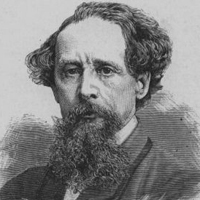Industrial Ugliness and Capitalistic Greed in Hard Times
In Hard Times, Dickens attacks the industrial evils practiced during his days. Coketown represents all industrial towns of red bricks and black soot; there are full of streets and lanes which are monotonously similar; the towns have houses of the same kind, so there is hardly any difference between the jail and the hospital and between the hospital and the town hall.

Charles Dickens
On a hot day Coketown is hell. It is a town of machinery and tall chimneys, with endless columns of smoke rising into the air. The novel Hard Times contains the vivid pictures of ugliness of the industrialism which was raising its head in the Victorian Age. Coketown is described as a town of machine since the people living in the same town are supposed to have any souls instead they all go in and out at the same hours, with the same purpose upon the same pavements, to do the same work. These pictures express the monotony of the workmen’s life in the Victorian Age. As the Victorian Age was assumed as an age of Industrialism and Capitalism, the workmen are not men at all; they are “hands”, so many hundred hands, “So many hundred horse steam power”. These men are not supposed to have any souls; they are hands who have to work upon “the crashing, smashing, tearing mechanisms, day in and day out”. Industrial town now gives importance to human beings for their competence to work and generate income, therefore the towns are like machines where materials are used, fuel is consumed and money is made. It is the fact that the man who makes money through the labor of these hands regards the smoke of the chimneys as meat and drink for the capitalist.
Dickens not only attack the industrial evils of his time, but also portrays capitalism and factory owner inhuman. As a manufacturer, Bounderby adopts an arrogant attitude towards the workmen and does not feel the least sympathy for them in their troubles or in their desire for a better life. He always expresses the view that these workmen want “to ride in a coach drawn by six horses and to be fed on turtle soup and venison, with a gold spoon”. His treatment of the workmen shows a mechanical mind; he looks upon the workmen as so many hundred “hands”, so many hundred horse steam power. Although Dickens tries to convey to us all the ugliness of the factories and the industrial town, he yet shows his awareness of the bright side of these factories when he writes: "The lights in the great factories, which looked, when they were illuminated, like fairy palaces".
Reading on Hard Times
Characterization in Hard Times
Irony and Satire in Hard Times
Characterization of Mr. Gradgrind
Victorian Society in Hard Times
 |
bachelorandmaster.com |